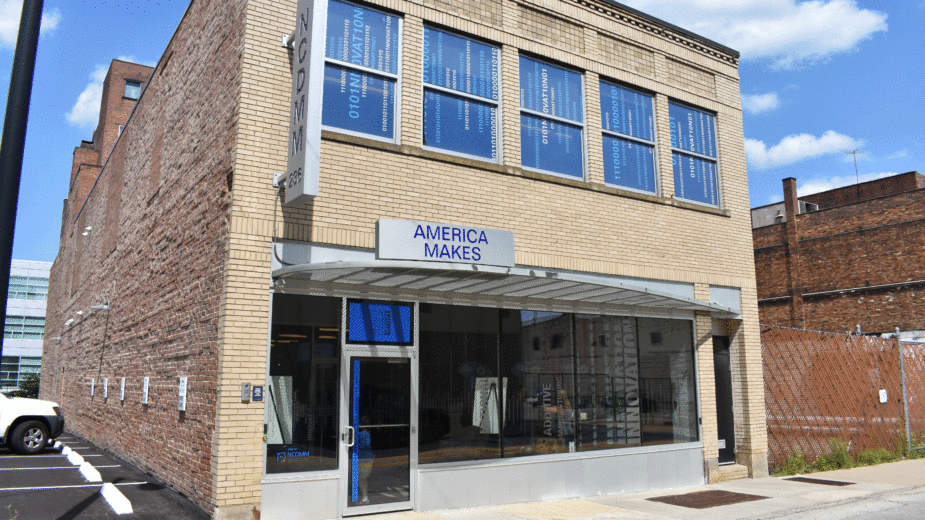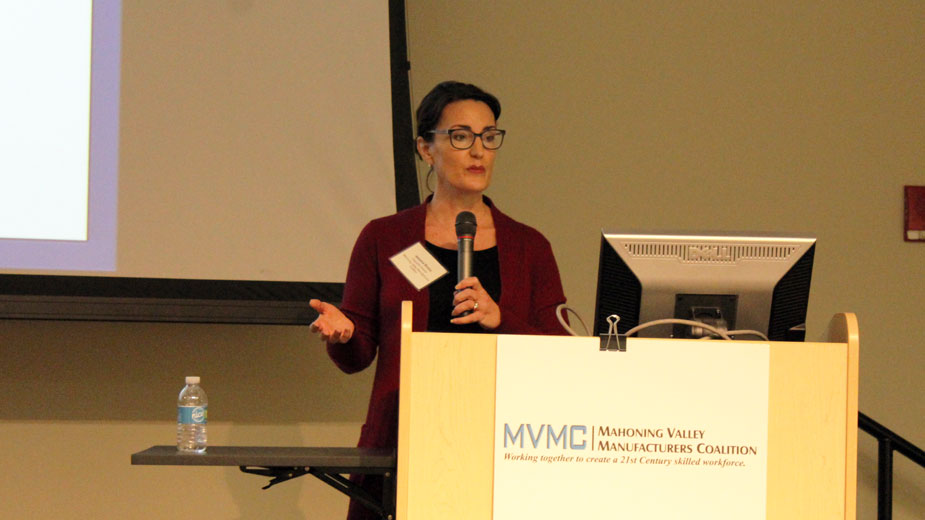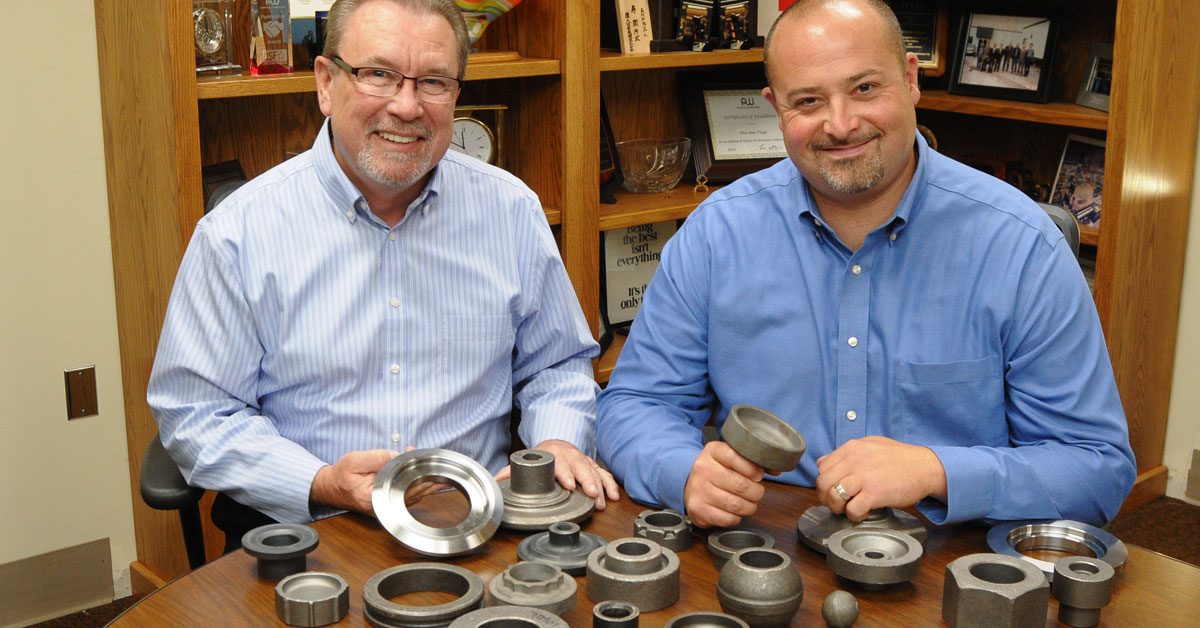At Haltec Corp., Inflation is a Good Thing
By Dan O’Brien
SALEM, Ohio – For every football tossed, kicked or fumbled on game day in the National Football League, sports fans across the country can give a loud cheer to a Salem-based company that has expanded to global proportions.
Several years ago, Haltec Corp. signed an agreement with Wilson Sporting Goods Co. that would provide the company air inflation systems for football manufacturing operations at Wilson’s plant in Ada, Ohio. That led to Haltec providing on-field inflation services to the NFL through Wilson.
It’s just one revenue stream for a manufacturer that over the years has emerged as a textbook example of steady vertical integration and technical agility, as it sets its sights on expansion.
“We were founded in 1970 by Frank Hall, who worked for Goodyear and sold to companies such as Caterpillar,” relates the company’s executive vice president, Dave Caruso. “As tires got bigger and bigger, he developed a super-large-bore valve that could fill a tire with air eight times faster than a valve in a regular truck tire.”
What began 48 years ago as a manufacturer of specialty valves for original equipment manufacturers has evolved into a company that has pioneered valve and inflation systems for over-the-road truck manufacturers, service plazas, Wilson, global mining companies and even Walt Disney World.
“We have about 90% of the original equipment market right now,” Caruso says, meaning that nine out of 10 over-the-road trucks that motorists see traveling along American highways use Haltec valves manufactured at the company’s 50,000-square-foot plant in Salem. And, customers today use Haltec automatic inflation systems and valves to help manage aftermarket wheel assemblies.
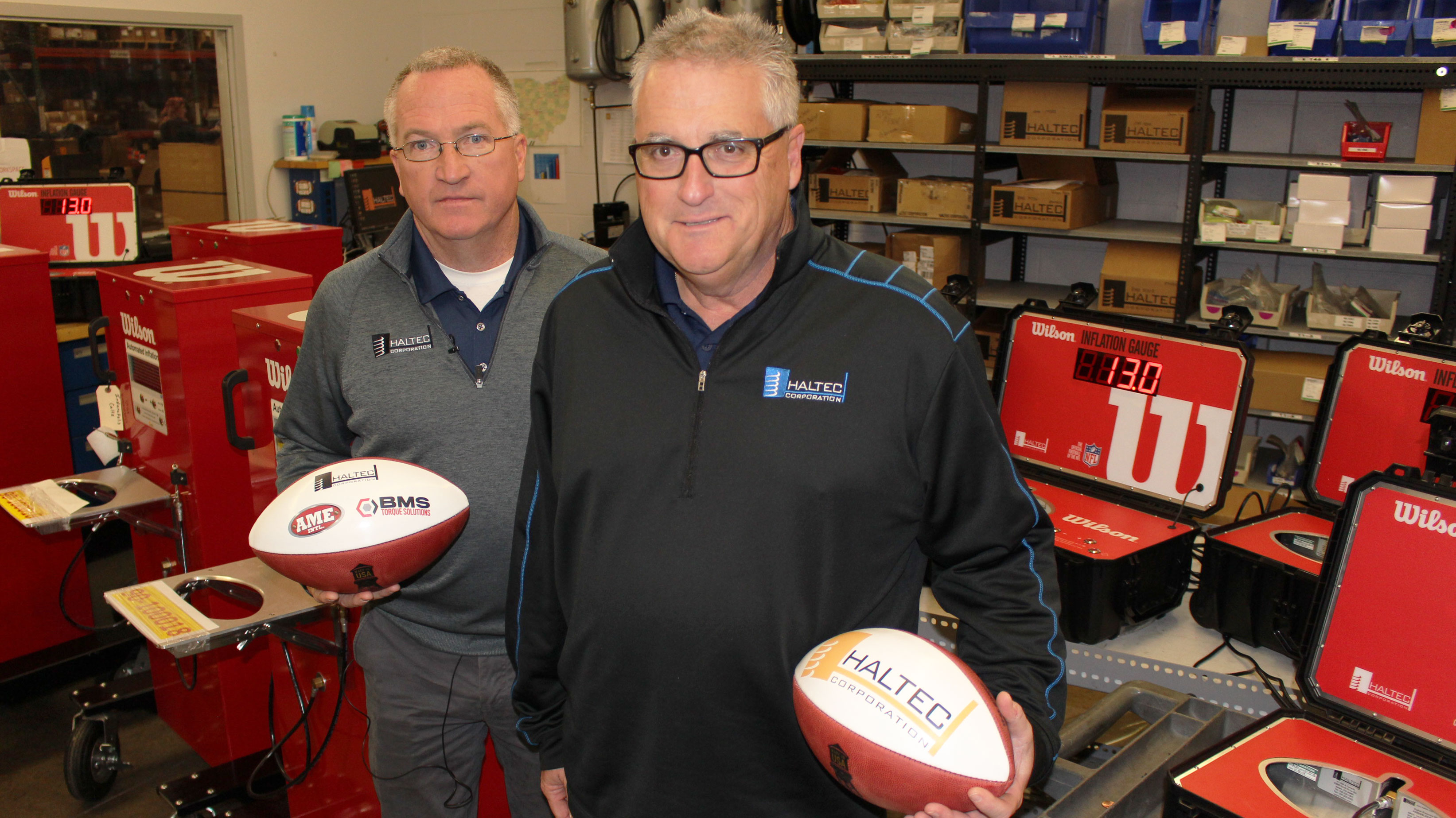 Ken Coyne and Dave Caruso hold footballs inflated by Haltec Corp.’s inflation system used by the NFL.
Ken Coyne and Dave Caruso hold footballs inflated by Haltec Corp.’s inflation system used by the NFL.
Moreover, Haltec has carved out a sizeable market internationally, especially in the mining industry, Caruso says. “Between 30% and 40% of our business is exports,” he reports.
In the company’s first decade, business remained steady with sales never cresting above $1 million annually. In 1986, Hall sold the company to Ed Russell, who worked for a supplier with aftermarket experience. “He had all these contacts in the aftermarket, and that’s when the business really started to grow,” Caruso says.
Haltec employed 10 when Caruso started at the company in 1986, he notes, with one product line. Today, Haltec employs 130 in Salem with a diversified product base that involves all aspects of tire rim assembly. “We sell the gauge, the chuck, the lug nuts, the tire management system,” he says.
Caruso is reluctant to share sales figures, but they obviously far exceed the modest numbers of Haltec’s early days.
As technology across the industry advanced, it opened the company up to new business lines, says Ken Coyne, director of sales and marketing. “We were challenged with selling technology,” he says. “This started about 20 years ago.”
That meant expanding Haltec interests from valve manufacturing to developing automated tire inflation systems, Coyne says. “We had two types of these systems when we started 20 years ago and now we have about 90,” he says. Today the inflation systems are used for numerous markets other than truck tires. “We use them to fill carbon-fiber pressure tanks, footballs, basketballs and bicycle tires.”
The company designs the scope and shape of a particular valve to meet the needs of the customer. From there, CNC mills automatically machine brass bar stock into valve heads, while the stems are formed simultaneously in another part of the plant. The stems and the valve heads are soldered together to form the part.“It’s a niche component. But it’s absolutely critical,” Coyne says. “We’re really a turnkey manufacturer of our core product.”
At the same time, technicians are working on electronics systems in another section of the Salem plant that will be installed in a new mobile inflation system – this one in particular for Penske Truck Group. The steel casings for the inflation units are fabricated in Salem through another vendor, and the systems are assembled at the Haltec plant. “They are made by hand, programmed and go through a quality control process,” Coyne says. The size, color and configuration of these units depend on the wishes of the customer, he says.
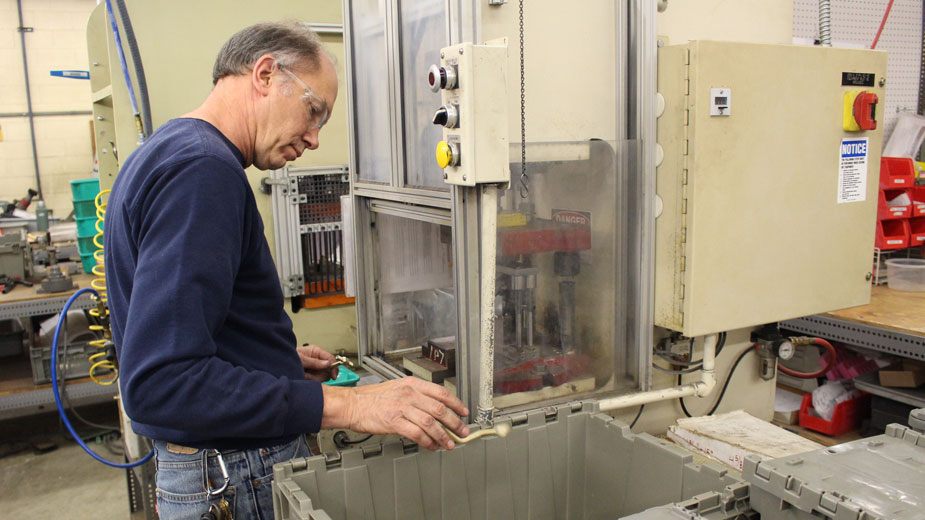 Andy Fountain uses a press that produces valve stems.
Andy Fountain uses a press that produces valve stems.
In addition to valves and inflation systems, the plant produces hose assemblies with swivel fittings and pressure gauges. There’s even an office furniture line made out of teak wood and recycled motorcycle tires the company markets, Caruso adds. “It’s a new line called Retyred,” he says.
Several years ago, Haltec opted to expand its holdings through the acquisition of a tire nut company in Florida and bought a research and development company in Limerick, Ireland, that is focused solely on torque. “We can provide specialty torque services for companies all over the world,” Caruso says.
The result is the creation of a comprehensive tire management program for global and U.S. customers.
“We’ve automated our technology by adding Bluetooth and Zigbee communication protocol to our whole process. All of the services – tire valves, torque, inflation – are connected via a software program that we market as the Haltec tire-management program,” he says. Customers also can use the menu of services a la carte.
Safety has emerged as a paramount factor in consumer travel, says Coyne, the sales director. And research and development related to torque is very important. “At our call center, we manage all of the buses with Goodyear,” he says. Haltec monitors all of the Goodyear bus tire systems in New York City, Los Angeles, Chicago and Walt Disney World.
“We mandate that they have the right hardware,” Coyne says, “and then we manage those vehicles with our software so we know the condition of that tire every time it’s checked.”
These advances have led to breakthrough deals with some of the biggest companies in the world, Coyne notes. Haltec, for example, shares a joint patent with Love Travel Stops for its TravelPass lanes at travel plazas across the country. The TravelPass lane allows a driver to fuel up while simultaneously monitoring critical issues such as tire pressure. “It’s being used nationwide,” he says.
Several years ago, Haltec signed a deal with Wilson to provide inflation services to its plant in Ada, where NFL footballs are hand-stitched.
“We redesigned their ball machine,” he says. “Wilson then saw some opportunities at the high school, college and NFL levels,” while Haltec provides inflation systems to all Wilson inflatable balls manufactured in Nashville. “We can inflate about 80 balls per minute. We’ll do 15 million to 16 million balls per year for all of their sales nationally.”
NFL teams use Haltec portable inflation systems on the field, while others are placed in the locker rooms. The devices can measure the accurate pounds per square inch of an inflated football and determine whether it’s within the NFL regulation window of 12.5 to 13.5 psi. “We provide the teams the inflators so they can meet the exact needs of a running back or receiver,” he says.
Coyne says the arrangement with Wilson is an example of how Haltec can provide consistency throughout the inflation process. “They manufacture the ball with a Haltec inflator. They use quality control before it goes out to the team with a Haltec inflator. The team uses a Haltec inflator for training, They prep the ball for game day using our equipment, officials use our system on game day,” he says.
That same path applies to a tire and wheel management system – from manufacturing the valve through digital management of the tire itself, Coyne says. “You bring consistency to the whole process.”
The company is also active in the commercial aerospace industry and manufactures valves and provides inflation systems for customers such as Delta and American Airlines.
“We have hundreds of systems all over the world,” he notes. “We make all the valves for Delta.”
Jason Howard, marketing strategy manager at Haltec, says that new inflation technology invites opportunities in the defense industry. “They buy a lot of valves from us. But all of their inflation systems are from the 1950s,” he says. “We have a whole lot of opportunity here, but you’ve got to get to the right people. And we’re working on that now.”
Moving in this direction makes sense, Caruso says, since the military often seeks out a single source that can provide service for its entire fleet – be it aircraft or terrain vehicles. “That’s where Haltec can come in,” he says. The company’s torque technology, for example, isn’t limited to tightening lug nuts, but relates to all critical assemblies as well.
As for the future, the next step is to physically expand the business with new manufacturing and distribution space, as well as introduce more room for research and development, Caruso says.
That’s what is driving a 50,000-square-foot expansion of the company at the World Trade Park in Leetonia, Caruso says. Earlier this year, Haltec bought a 20,000-square-foot building once occupied by the Columbiana County Port Authority. The adjoining lot has enough room for expansion, and that’s where the company is looking to construct a new building for manufacturing and distribution.
“We’re growing with the right hardware and the right software,” Coyne says. “Chasing technology.”
Copyright 2024 The Business Journal, Youngstown, Ohio.
